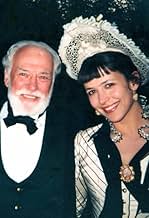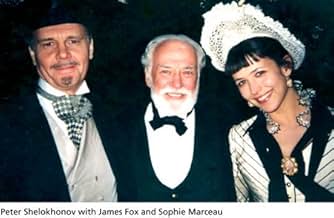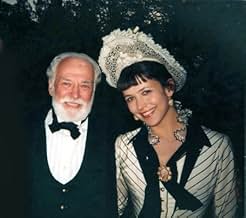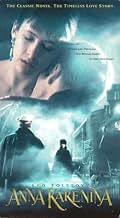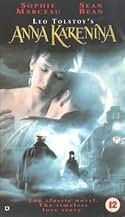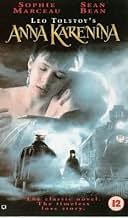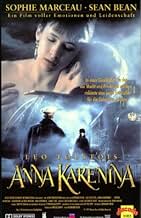NOTE IMDb
6,3/10
6,3 k
MA NOTE
Anna (Marceau) est une épouse et une mère qui a une liaison avec le beau comte Vronsky. D'après le roman de Tolstoï.Anna (Marceau) est une épouse et une mère qui a une liaison avec le beau comte Vronsky. D'après le roman de Tolstoï.Anna (Marceau) est une épouse et une mère qui a une liaison avec le beau comte Vronsky. D'après le roman de Tolstoï.
- Réalisation
- Scénario
- Casting principal
Petr Shelokhonov
- Kapitonich, Chief Butler
- (as Pyotr Sholokhov)
Avis à la une
I'm not sure how this movie slipped past me, as I try to stay on top of the period movies that come out. Nonetheless I caught it on one of the Encore channels last night, and I'm glad I did. Visually this movie is incredible! The cinematography could not have been much better, down to small details such as Levin "mowing" in the fields with the scythe in perfect rhythm with the workers.
As much as I like the film, however, I'm disappointed that Sophie Marceau's portrayal of Anna was not more passionate. On the whole I thought her performance was pretty good, but I agree with the comments above that she could have exhibited a much more involved and emotional presence in the face of a love that she could not resist. Ditto for Sean Bean, although he was somewhat better at it than Sophie. It's a situation where one fervently wishes that the actors were better than they were, because you know that it would have made the movie a "10." Both Bean and Marceau did provide some excellent glimpses into the souls of their characters, but only glimpses. One would wish for more intimate looks into their motivations and their respective desolations. I was not at all put off by accents of the actors. So Marceau has a mild French accent...French was the dominant language of the Russian court up to the Revolution, so it would not have been out of place at all.
The story of Levin and Kitty fares better, if only because of the stellar performance of Alfred Molina. Offhand I can't think of a more underrated actor (save perhaps Ron Perlman). Ms. Kirshner was fine as Kitty, although her journey from infatuation with Vronsky to love for Levin was given short shrift.
Overall I loved this movie, but I just wish it had been two marks better.
As much as I like the film, however, I'm disappointed that Sophie Marceau's portrayal of Anna was not more passionate. On the whole I thought her performance was pretty good, but I agree with the comments above that she could have exhibited a much more involved and emotional presence in the face of a love that she could not resist. Ditto for Sean Bean, although he was somewhat better at it than Sophie. It's a situation where one fervently wishes that the actors were better than they were, because you know that it would have made the movie a "10." Both Bean and Marceau did provide some excellent glimpses into the souls of their characters, but only glimpses. One would wish for more intimate looks into their motivations and their respective desolations. I was not at all put off by accents of the actors. So Marceau has a mild French accent...French was the dominant language of the Russian court up to the Revolution, so it would not have been out of place at all.
The story of Levin and Kitty fares better, if only because of the stellar performance of Alfred Molina. Offhand I can't think of a more underrated actor (save perhaps Ron Perlman). Ms. Kirshner was fine as Kitty, although her journey from infatuation with Vronsky to love for Levin was given short shrift.
Overall I loved this movie, but I just wish it had been two marks better.
Along with War and Peace, Anna Karenina is one of the greatest Russian novels and one of the greats of 19th century literature, the story is heart-breaking and intense and the characters compelling. Anna Karenina has often been filmed, and of the film versions the 1967 Russian and 1935 Greta Garbo films fare the best and the 2012 Joe Wright-directed version the weakest. This 1997 adaptation from Bernard Rose (Paperhouse, Immortal Beloved, Candyman) has a good amount to like but is one of the weaker adaptations.
Visually, the film looks absolutely stunning and along with the 1967 Russian film it is one of the most evocative adaptations period detail-wise. Although some of the editing is choppy, the cinematography is ravishing and the costumes and sets are some of the most beautiful and evocative of any adaptation of Anna Karenina, especially in the opulent ballroom scene and the gorgeous wintry landscapes. The Tchaikovsky-laden music score makes for an aural feast and couldn't have fitted more perfectly.
Three performances are good. Coming off best is Alfred Molina, who brings authority and many layers to Levin, wish more was done with developing the character more in terms of writing but at least the film included the character and his subplot with Kitty. James Fox is a ruthlessly cold and haunting Karenin, the character played consistently well in all the Anna Karenina adaptations even in the not-so-good ones. Sean Bean is a handsome Vronsky, but brings a steely intensity to the role that stops the character from being wooden or tragic, rightfully avoiding the dashing heroic figure stereotype.
Sophie Marceau however I found miscast as Anna, she looks splendid but is pretty vacuous and lacking in passion. Her chemistry with Bean convinces in the latter and more turbulent parts of the relationship but dull in the early parts. Mia Kirschner is also rather too modern and lightweight for Kitty. This version of Anna Karenina is a visual and aural stunner with a few impressive performances, but is one of the least successful and interesting versions in terms of script and how the story is told.
The dialogue doesn't always flow naturally, and feels very dry in tone and with little depth and substance, and the narration was rather unnecessary. Rose's direction shows terrific technical assurance but lacks the same kind of momentum in telling the story. It's the story where the film most falls down, feeling far too short and far too rushed, with about half of the story (or so it feels) being told but all in Cliff Notes version, and it even feels like more of the film was filmed but cut due to studio interference. Neither of the romances are dealt with well, Anna and Vronsky's is too rushed and the very incomplete-feeling one between Levin and Kitty sometimes really slows down the film.
Overall, not a bad version but a less than ideal one, as an adaptation and as a film on its own. 5/10 Bethany Cox
Visually, the film looks absolutely stunning and along with the 1967 Russian film it is one of the most evocative adaptations period detail-wise. Although some of the editing is choppy, the cinematography is ravishing and the costumes and sets are some of the most beautiful and evocative of any adaptation of Anna Karenina, especially in the opulent ballroom scene and the gorgeous wintry landscapes. The Tchaikovsky-laden music score makes for an aural feast and couldn't have fitted more perfectly.
Three performances are good. Coming off best is Alfred Molina, who brings authority and many layers to Levin, wish more was done with developing the character more in terms of writing but at least the film included the character and his subplot with Kitty. James Fox is a ruthlessly cold and haunting Karenin, the character played consistently well in all the Anna Karenina adaptations even in the not-so-good ones. Sean Bean is a handsome Vronsky, but brings a steely intensity to the role that stops the character from being wooden or tragic, rightfully avoiding the dashing heroic figure stereotype.
Sophie Marceau however I found miscast as Anna, she looks splendid but is pretty vacuous and lacking in passion. Her chemistry with Bean convinces in the latter and more turbulent parts of the relationship but dull in the early parts. Mia Kirschner is also rather too modern and lightweight for Kitty. This version of Anna Karenina is a visual and aural stunner with a few impressive performances, but is one of the least successful and interesting versions in terms of script and how the story is told.
The dialogue doesn't always flow naturally, and feels very dry in tone and with little depth and substance, and the narration was rather unnecessary. Rose's direction shows terrific technical assurance but lacks the same kind of momentum in telling the story. It's the story where the film most falls down, feeling far too short and far too rushed, with about half of the story (or so it feels) being told but all in Cliff Notes version, and it even feels like more of the film was filmed but cut due to studio interference. Neither of the romances are dealt with well, Anna and Vronsky's is too rushed and the very incomplete-feeling one between Levin and Kitty sometimes really slows down the film.
Overall, not a bad version but a less than ideal one, as an adaptation and as a film on its own. 5/10 Bethany Cox
Visually, this film is gorgeous. Sophie Marceau is perfect as Anna and Alfred Molina also shines. Sean Bean, known for finding the humanity in the worst of characters, is the most likeable, sympathetic and attractive Vronsky I have seen. He does not portray the transformation of the selfish, spoilt, wealthy and aristocratic mother's darling into a deeply remorseful, more mature individual who learns that there is a price to pay for taking whatever you want and you had better consider the price worth it. A pity as the contrasting story of Levin (Alfred Molina) and his unselfish devotion to Princess Kitty requires that the point be made. You reap what you sow. Similarly, James Fox is too tolerant and long-suffering as Karenin. Tostoy's Karenin is a self-important bureaucrat who disguises his revenge on Anna as piety. HOWEVER...maybe not be accurate Tolstoy but the sheer niceness of all the characters makes one care far more when tragedy strikes than I ever did when I read the book. Gorgeous music also.
Which is entirely to be expected with a novel the size and complexity, I'm told, of Leo Tolstoy's "Anna Karenina", which I have not read.
I will blushingly admit that I first viewed this film mostly because of Sean Bean's presence. I found him a superb actor in the Lord of the Rings, and hoped to find more in his other works.
Truthfully, his portrayal of Vronsky feels somewhat light in this film; I attribute this to three factors: the severe compression of the novel (as happens with all film adaptations), the actual nature of the character itself, and the slightly boring task of playing mostly passion. Unlike other viewers, I found it very difficult to sympathize with Vronsky, and his repentance hollow. My heart melted somewhat, though, during his flashback to Karenina's corpse at the railway, and his brimming eyes as the train pulled away. Redeemed slightly at the very last moment.
Sophie Marceau is stunning as Anna Karenina; I found her enchanting from the start. Marceau plays the title lady with dignity, elegance, and grace; in her more intimate and emotional moments, she portrays Karenina's motherly and passionate sides with skill.
The inevitable flaws of adaptation show through in this film; there are numerous location changes, and multiple "quick" passages of time. Every event feels strung together by a thread, which they likely are, chosen for their narrative value. Yet it doesn't work, as the overall result lacks a palatable sense of cohesion. The love story of Karenina and Vronsky feels chopped and rushed, as does the tale of Levin and his Kitty -- which is too bad, since they are both the anchor narratives. The contrast of the two, however, plays well, and reminds me of the romances in Michael Ondaatje's "English Patient" (I'm well aware Tolstory precedes Ondaatje).
The greatest features of "Anna Karenina" lie in the atmosphere. Despite the out-of-place original accents of the actors, Russian is spoken skilfully, and the chosen music is beautiful and appropriately evocative of an older, grander time. and the lovely landscapes of Russia play a beautiful role in the background. The costumes and sets are breathtaking; the highlight is surely the ballroom scene, when all are attired for an evening "out" and Tchaikovsky's Swan Lake Waltz is playing.
While an excellent effort, "Anna Karenina" eventually feels like what it is: a cinematic adaptation of a novel.
I'd give it a 8 out of 10.
I will blushingly admit that I first viewed this film mostly because of Sean Bean's presence. I found him a superb actor in the Lord of the Rings, and hoped to find more in his other works.
Truthfully, his portrayal of Vronsky feels somewhat light in this film; I attribute this to three factors: the severe compression of the novel (as happens with all film adaptations), the actual nature of the character itself, and the slightly boring task of playing mostly passion. Unlike other viewers, I found it very difficult to sympathize with Vronsky, and his repentance hollow. My heart melted somewhat, though, during his flashback to Karenina's corpse at the railway, and his brimming eyes as the train pulled away. Redeemed slightly at the very last moment.
Sophie Marceau is stunning as Anna Karenina; I found her enchanting from the start. Marceau plays the title lady with dignity, elegance, and grace; in her more intimate and emotional moments, she portrays Karenina's motherly and passionate sides with skill.
The inevitable flaws of adaptation show through in this film; there are numerous location changes, and multiple "quick" passages of time. Every event feels strung together by a thread, which they likely are, chosen for their narrative value. Yet it doesn't work, as the overall result lacks a palatable sense of cohesion. The love story of Karenina and Vronsky feels chopped and rushed, as does the tale of Levin and his Kitty -- which is too bad, since they are both the anchor narratives. The contrast of the two, however, plays well, and reminds me of the romances in Michael Ondaatje's "English Patient" (I'm well aware Tolstory precedes Ondaatje).
The greatest features of "Anna Karenina" lie in the atmosphere. Despite the out-of-place original accents of the actors, Russian is spoken skilfully, and the chosen music is beautiful and appropriately evocative of an older, grander time. and the lovely landscapes of Russia play a beautiful role in the background. The costumes and sets are breathtaking; the highlight is surely the ballroom scene, when all are attired for an evening "out" and Tchaikovsky's Swan Lake Waltz is playing.
While an excellent effort, "Anna Karenina" eventually feels like what it is: a cinematic adaptation of a novel.
I'd give it a 8 out of 10.
Of all the versions of the Tolstoy novel which I have seen (two with Greta Garbo, the deplorable one with Vivien Leigh, another with Jacqueline Bisset), this is the one that really reflects the scope and social observation of the book. The careful direction and art direction, the St.Petersburg backgrounds, as well as the exquisite cinematography, make this movie a real feast for the eyes, with magnificent plastic compositions and lighting in every shot. The abused Tchaikovsky music was used discreetly. Sophie Marceau plays a very young Anna, and makes her credible all the time. Sean Bean and James Fox, as Vronsky and Karenin, are admirable. And even if the screen play by director Bernard Rose is a little too literary, the complete story was told, and the result was the best Anna Karenina the screen has offered.
Le saviez-vous
- AnecdotesThis was the first western production of "Anna Karenina" to be filmed in Russia (St. Petersburg).
- GaffesDuring the movie, title cards inform the viewer that the story arch unfolds in the years 1880 to 1882 - yet at the end of the movie Vronsky leaves to fight in the Russo-Turkish war of 1877- 1878.
- Citations
Anna Karenina: What are you doing here?
Vronsky: You know that I have come to be where you are. I cannot help myself.
- ConnexionsReferenced in 13 posterunek: Kalambury filmowe (1998)
- Bandes originalesSymphony No. 6 in B Minor, op. 74 (Pathetique)
Written by Pyotr Ilyich Tchaikovsky (as Peter Ilyich Tchaikovsky)
Performed by The St. Petersburg Philharmonic Orchestra
Conducted by Georg Solti (as Sir Georg Solti)
Courtesy of Icon Records and London Records
Meilleurs choix
Connectez-vous pour évaluer et suivre la liste de favoris afin de recevoir des recommandations personnalisées
- How long is Anna Karenina?Alimenté par Alexa
Détails
- Date de sortie
- Pays d’origine
- Sites officiels
- Langues
- Aussi connu sous le nom de
- Anna Karenina
- Lieux de tournage
- Sociétés de production
- Voir plus de crédits d'entreprise sur IMDbPro
Box-office
- Budget
- 35 000 000 $US (estimé)
- Montant brut aux États-Unis et au Canada
- 858 553 $US
- Week-end de sortie aux États-Unis et au Canada
- 75 268 $US
- 6 avr. 1997
- Montant brut mondial
- 858 553 $US
- Durée1 heure 48 minutes
- Couleur
- Mixage
- Rapport de forme
- 2.35 : 1
Contribuer à cette page
Suggérer une modification ou ajouter du contenu manquant

Lacune principale
By what name was Anna Karénine (1997) officially released in India in English?
Répondre

